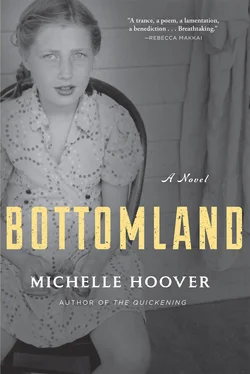“That right?” Tom said.
“Well,” said Mr. Elliot.
I headed home, my hand to my forehead against the sun. Only with a wary glance did I search their smokehouse and barn, the far corner of their stables. It was full daylight now and the fields were barren after harvest. Far off, a scabby break of trees showed at the horizon. The river that marked the border between our two families seemed no more than a run of weeds. The Elliots’ house perched in its yard like an old crow, the wood blackened, while our own sat dust-colored and brown, a stretch of boxes with the girls’ room a cap on top. For a good quarter mile I imagined the Elliots watching me as I went, waiting for me to cross the river again. Old Elliot had hung that flag on his porch when Tom came home from the service, and he’d posted a sign at the market in town, next to the door. “Shouldn’t we be concerned,” the sign had read, “about the enemy living among us?” Then in a larger hand:
TUESDAY MEETING
COUNCIL OF NATIONAL DEFENSE
SEVEN IN THE EVENING
THE ELLIOTS
At the riverbank, I turned at last to see Tom standing alone on the porch. I waved, but he ducked inside. A strange boy, but strange didn’t mean badness. He could hardly rope a calf, least of all harm a girl, and surely Dora kept him in line. But if there were men like Tom Elliot after the war, how many worse had come home?
When Patricia saw me across the fields, she gave a sad shake of her head. The Clarks might have made for an easier visit, the group of them being the more talkative, but as a family of women — three rabbity sisters and their mother, their father an invalid in his bed — talk was often all they did. Agnes ran ahead of Patricia to the chicken pen, a coat across her shoulders and my dress dragging behind her. Off to the east, Ray worked the horses, bent to press the blades of the harrow to level the fields. I thought of the broken chair, the way Ray had so easily snapped the leg in two, despite his ruined hand. The girls must have propped the chair up to block the door, or someone had, making it difficult to leave the room or enter it. But who did they want to keep out — or in? At night, Father always locked the main doors both inside and out. He kept the keys on the hook by his bed, and I carried the same in the pocket of my apron. Through the fabric, I felt for their dull weight. Across the pasture, Patricia called my name, the sound like a swarm of insects. A grunt from the fields, and there was my brother bent over his work, his shoe coming down on the harrow’s spine as if he had hit a stone. He had no time to search for the girls, not when they’d only run off on a stunt — or so he believed. Now Ray moved like a dark shape in those fields, driving the horses as hard as he could.
“Someone must have taken them,” Patricia said. “That’s what I think.”
She scurried about the kitchen, gathering plates. I kept my tongue. Already the house had fallen into disarray, the beds from the morning unmade, the wash only just drying, and still the door open at the top of the stairs. The boys would come in soon from the fields though dinner would be late. Ray had insisted we finish the day’s work and have our evening meal as if nothing had changed. “They’ll be home before nightfall,” he said. Now the sun had dropped low behind the washhouse. Another hour, and the light would be gone altogether. Patricia stared out the window, worrying the rings on her fingers. “It’s terrible. Terrible.”
“Oh, come,” I said.
“There was that twelve-year old girl in Le Mars,” she went on. “Alta Brown, Braun, something or other. They found her near those railroad tracks for the Illinois Central. Neighbor thought she was a store dummy lying there ’til she found out it wasn’t. One day the girl was in her bed. The next, gone.”
“You can’t believe every story you hear.”
“But it wasn’t a story,” she said. “They printed it in the newspaper.”
“Well.”
“And what about Villisca? A whole family killed in their sleep. By a minister no less.”
“This isn’t Villisca,” I said. “It isn’t anywhere close.”
“It most certainly isn’t.” Patricia dropped a clean set of plates on the table. “You can never be sure of a place. That’s all I’m saying.”
My knife slipped on a potato skin, a bloody gash. I wet my finger in my mouth.
“And that window in their room.,” Patricia started again.
“That window isn’t much larger than my hips.”
Agnes rushed in, my dress pinned so it drooped like an apron. I didn’t have the heart to tell her to go to her room to find something else. “Myrle could have gotten through.”
“I doubt it,” I said. “And Myrle is far too timid.”
“Someone came through that window,” Patricia groaned. “Some strange little man.”
“No one would have seen him,” Agnes added.
“Stop it, the both of you. I don’t see the use in talking this way.” My finger pulsed, the taste of blood in my mouth. I bit it until it bled again. “As far as we know, the girls lost track of time and are staying in town.” But there was no place for the girls to stay overnight, even I knew that. They had never kept away from home for so long.
Agnes sat at the table, her eyes turned up in thinking. The girl was bookish and no taller than my waist, far too stunted for her eighteen years. When she spoke, her voice sounded clipped, as if counting off facts on her fingers. “There’s a trunk missing too,” she said. “The one we kept in the front hall. It’s gone.”
“Father got rid of that trunk last year. I’m sure of it.”
“And the chair?” Agnes asked. “I read a story like that. A man blocks the door with a chair after he kills his wife. That way, he keeps anyone from finding out until he’s miles off.”
“For heaven’s sakes,” Patricia said.
“You shouldn’t be reading such things. ” But before I could finish, my brothers swept through the door, their shirts caked with muck.
“Good Lord in Mercy.” Patricia laid a hand to her chest. “You near scared me to death.”
“Wash yourselves,” I said.
Ray grimaced. “Aren’t they back?”
“We should have gone to town,” Lee complained.
“Yes.” I sighed. “But Ray wanted to wait.”
Ray sat at the table, leaning hard on his elbows. “We can go tomorrow, first thing, if they aren’t back. You, myself, and Lee.”
Agnes pursed her lips. “Do we really need to tell everyone?”
“Why not?” I asked.
Father’s footsteps sounded in the yard. He opened the kitchen screen and sank into a corner chair. In his overalls and old leather hat, the one that smelled of smoke and damp, he gazed at the floor, his face hidden except for his beard. The cuffs of his pants were muddy from the river, a leaf sticking to the foot of his cane.
“We’ll go to town at first light,” Ray said. “We’ll find them there, or someone will have seen them.”
“I will go with you,” Father said.
“It would be better you didn’t. With all the trouble. ”
Father raised his chin and Ray hushed. I set a cold plate of chicken on the table, a bowl of potatoes, and a loaf of our farmer’s bread. The boys eyed the chicken, hands in their laps. The sun was setting. Through the window, the light blazed on the horizon until it vanished. “It’s the only dinner we’ve got,” I said. “We didn’t have the time. Not with the girls. ”
Father snapped his cane. “I will go with you.”
We held our breaths.
“All right,” Ray let out.
“Right,” Father said. His hand trembled and he clasped it with the other, as if praying.
“Well now.” Patricia pushed at the meat with her fork, her voice strained. “Eat up, why don’t you?” We stared at our plates. The room seemed too full with all of us at once, the chicken an ugly cut of meat. Only Ray dared pick up his knife. A speck of rain struck the windows, the drops cold and sharp, then a rush. “Oh,” Patricia sighed. And soon she was sighing and more. “Oh, those girls.”
Читать дальше












